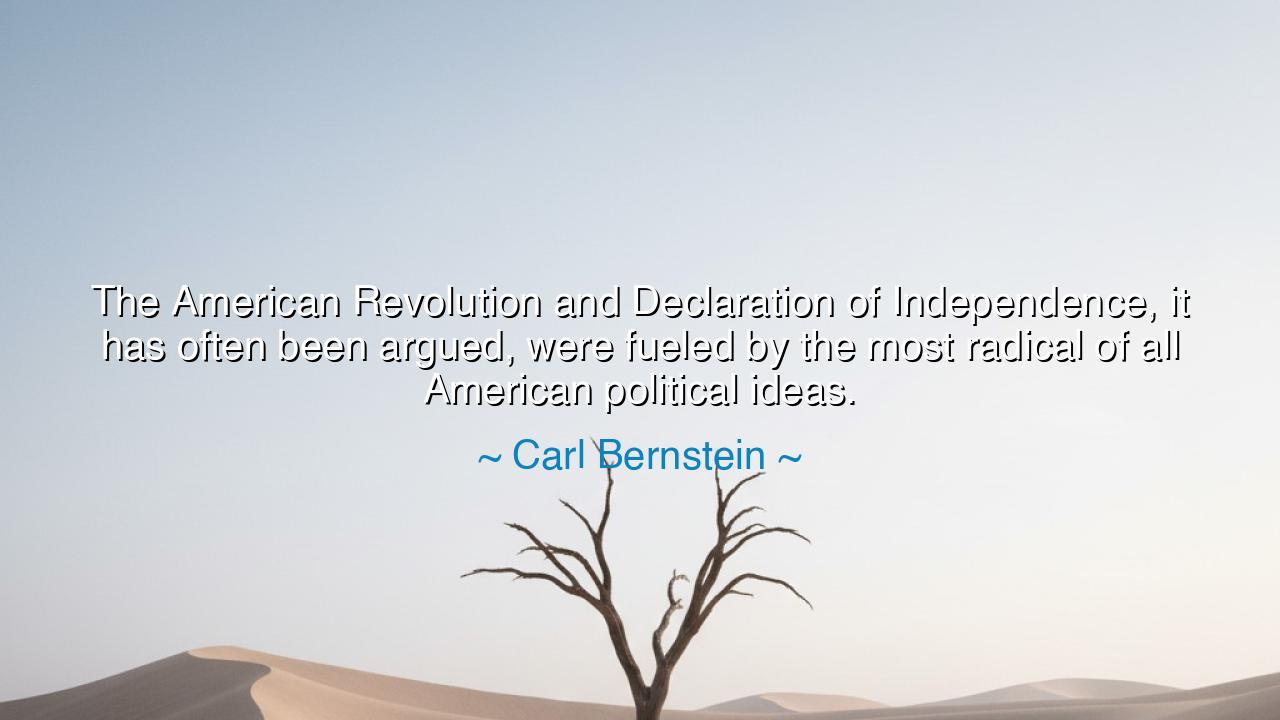
The American Revolution and Declaration of Independence, it has
The American Revolution and Declaration of Independence, it has often been argued, were fueled by the most radical of all American political ideas.






There are ideas so powerful that they burn through centuries, reshaping the destiny of nations and the hearts of humankind. When Carl Bernstein declared, “The American Revolution and Declaration of Independence, it has often been argued, were fueled by the most radical of all American political ideas,” he was pointing to one such fire — a flame that began not with muskets or militias, but with a thought: that all men are created equal, that power comes not from kings but from the consent of the governed, and that liberty is not the privilege of the few, but the birthright of all. In these words, Bernstein reminds us that the truest revolutions begin not with weapons, but with ideas — and that the most dangerous idea of all is the belief that ordinary people can govern themselves.
The origin of this thought lies deep within the soil of the eighteenth century — an age when monarchs ruled by divine right, and empires stretched across oceans, claiming dominion over millions. The American Revolution, as Bernstein observed, was not merely a rebellion against British taxes or trade laws. It was a rebellion against an ancient order — against the very notion that some were born to command and others to obey. When Jefferson, Adams, and Franklin wrote the Declaration of Independence, they were not drafting a complaint; they were composing a creed. They declared that human equality and unalienable rights were not gifts from rulers, but the essence of nature itself. In a world accustomed to hierarchy, this was heresy — and yet, it was a heresy that gave birth to freedom.
To call these ideas radical is to understand their revolutionary depth. For centuries, humanity had lived under the shadow of authority — kings crowned by heaven, nobles entitled by birth, priests commanding by fear. The American founders shattered that inheritance with a single truth: that sovereignty resides in the people, not above them. It was not simply a political shift, but a moral awakening — a declaration that the worth of a person is not measured by bloodline, but by reason, virtue, and conscience. That belief, once unleashed, could not be contained within America’s borders. It rippled outward, inspiring revolutions in France, in Haiti, in Latin America — echoing across continents as the anthem of the oppressed.
Yet, as Bernstein suggests, these radical ideas were not easily lived. The same nation that proclaimed liberty also tolerated slavery; the same founders who spoke of equality denied it to women and the poor. The Revolution’s ideals, though immortal, were born into a world that could not yet bear their full truth. And so the struggle continued — through civil wars and civil rights, through the march of abolitionists, suffragists, and reformers who refused to let the dream decay into hypocrisy. The radical idea lived on, not because it was perfect, but because it demanded perfection — a constant renewal of conscience. Each generation, Bernstein implies, must decide whether to defend that idea or betray it.
Consider the courage of Frederick Douglass, once enslaved, who held the words of the Declaration as a mirror to the nation’s conscience. “What, to the American slave, is your Fourth of July?” he asked — not to reject the founding vision, but to remind the nation of its promise. For Douglass understood what Bernstein would later echo: that the radical idea of freedom is not a relic, but a responsibility. It is not enough to inherit liberty; one must constantly fight to make it real — in law, in spirit, and in the hearts of all.
The greatness of the American Revolution was not that it ended tyranny once and for all, but that it introduced into the world a permanent revolution of thought — the conviction that every human being possesses inherent dignity, and that governments exist to serve, not to rule. Bernstein’s insight, though framed in modern words, carries the resonance of ancient truth: that the most transformative power in history is not violence, but vision. A sword can cut chains, but only an idea can keep them from being forged again.
So, my child, learn this lesson well: freedom is not born once in battle; it must be reborn every day in the hearts of those who believe in it. The radical idea that gave life to America is not the property of a nation, but of all humankind — that no person is too small to matter, no voice too weak to be heard, no dream too bold to be pursued. Guard that idea as the ancients guarded fire. Nurture it, feed it with courage and truth, and pass it to those who come after you. For as long as that idea burns within even one soul, the light of liberty shall never fade from the earth.






AAdministratorAdministrator
Welcome, honored guests. Please leave a comment, we will respond soon